 At my local bank this week, signs alerted me that they’re “making changes” to some of their plans and fees.
At my local bank this week, signs alerted me that they’re “making changes” to some of their plans and fees.
You’d be right to assume that some of those changes are increases. Overdraft protection goes up by $1 per month, and a monthly fee is no longer waived with a minimum balance. Give BMO credit, though; account history inquiries are now free instead of 85 cents apiece. That means they can legitimately claim “changes” rather than “increases.”
“Our fees are changing” reminded me of other corporatespeak and jargon seen in the wild. Here’s a sampling from my collection of offenders, along with what I think they mean:
- [Name] will share imperatives for [action]: [Name] will share why we need to act
- It’s a paradigm shift: it’s a change in focus
- We have actioned the design: I’m not sure about this one; maybe “We’re now using the design”?
- Measures to mitigate community noise impacts: Ways to address [or even better, reduce] community noise
- [Name] has one of the largest gold reserve endowments in the world, providing tremendous optionality to a rising gold price: Large endowments suggest the company has lots of gold in the ground; optionality is “The quality of being available to be chosen but not obligatory,” so I’m guessing it means “If gold prices go up, we’re digging up that gold.” What do you think?
- CEOs love it because they can resonate to it: Ugh. Usually, something resonates with someone, like a book theme resonates with the reader. Better to leave this as “CEOs love it.” Don’t get me started on the misuse of the word resonate.
- We will implement changes in our talent lineup: We fired 100 of our on-air personalities.
Some of the above real-life examples make it obvious that avoiding jargon is a good idea:
- You’re easier to understand without jargon. What does “We have actioned the design” mean? It isn’t clear.
- You seem smarter when you’re easy to understand. A 2006 study found that the more writers inflated their language, the less likely they were to be seen as intelligent.
- You’re more concise without jargon, so busy people can understand even if they skim the words or aren’t paying close attention.
- You’re more conversational without jargon, so you sound like a human rather than a robot.
- Impressing your audience is not a legitimate reason for using a fancy word. “Weed out vague jargon and complicated words and replace them with common terms,” says Hoa Loranger for Nielsen Norman Group. “Your readers will like you more.”
- You’re more likely to be trusted when you’re easy to understand. “The right words can make or break trust,” Loranger says.
Jargon “makes you and everyone around you progressively less intelligent,” as Inc.com’s contributing editor, Geoffrey James, puts it. Don’t let your company use it.
Related reading:
A roundup of corporatespeak, including “pursuing other opportunities”
More on jargon, with my list of top offenders in 2017
Look up or submit confusing jargon with The Ridiculous Business Jargon Dictionary
